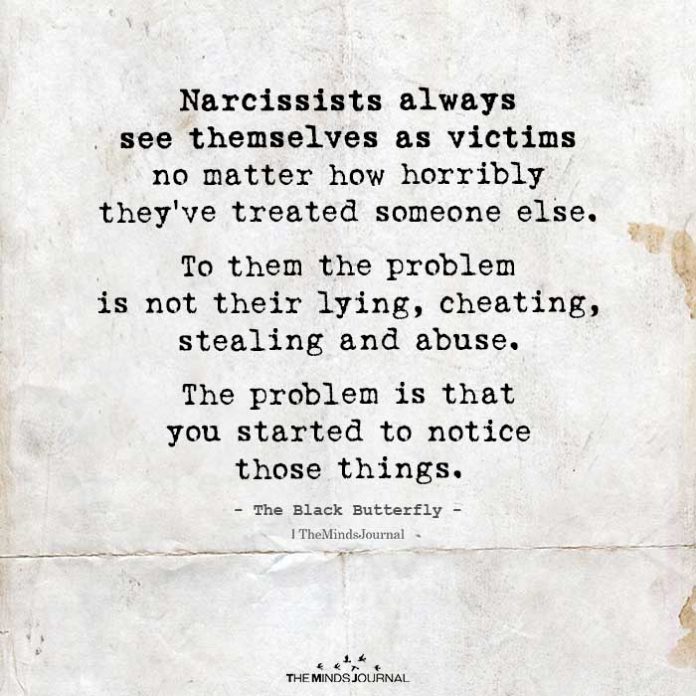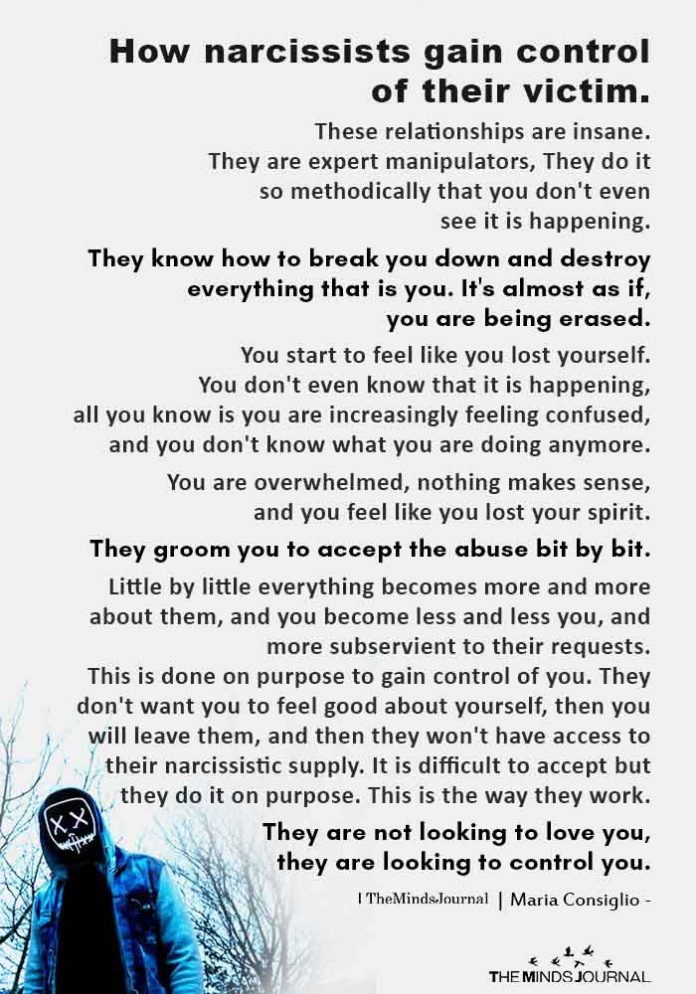What happens to narcissists as they age? Does karma finally catch up to them? Or do they start realizing how they have abused others? Let’s take a look at the fate of a narcissist aging.
The aging narcissist
Aging is a natural part of life and all of us have to go through this as we progress through the developmental stages of life. With age comes new found maturity and wisdom that enables us to navigate life experiences better. But what happens to the narcissist? Can they lie, manipulate, and cheat their way out of old age?
No, they can’t. Despite how manipulative they might have been in their youth, narcissists also get old like the rest of us. And it can be really challenging for the aging narcissist to adjust with old age.
Why? Because a narcissist gets worse with age.
Narcissists want to be the center of attention. They desperately crave praise, approval, validation, and admiration from others. However, with the passing of years, the flow of praises seems to vanish.
As our society is obsessed with beauty and youth, life can get seriously bad for the elderly narcissist. They start to question their own worth, feel vulnerable, and tend to give in to their insecurities.
So what happens to narcissists in old age?
Narcissist old age is riddled with challenges. Their tendency to see themselves as better than others leads to a lot of issues with self-image in their older age.
What they believed in the prime of their youth is proven wrong with time as reality hits them. As they struggle with old age, their social standing becomes weaker and things start going downhill for them.
Read also: Why The Narcissist Devalues You? 5 Reasons You Should Know

They become less narcissistic
So what eventually happens to an aging narcissist? Fortunately, for most narcissists, their toxic traits tend to wane with age. Although, this might not be true for all narcissists.
According to a recent 2019 study released by the Journal of Personality and Social Psychology, specific personal relationships and career choices can lead to less narcissism in certain individuals by middle age.
The study, which spanned over a 23-year period, from young adulthood to midlife, found that “narcissists become less narcissistic with time,” writes author Kyle Schnitzer.
The researchers primarily focused on 3 crucial aspects of narcissism in an aging narcissist:
- Entitlement
- Leadership
- Vanity
The study analyzed around 500 narcissist old age participants from the time they started college at the University of California Berkeley till the narcissists were 41 years of age. The researchers used survey questions to assess the narcissistic traits of the participants.
The study states “Participants who were in supervisory positions showed smaller decreases in leadership, and participants who experienced more unstable relationships and who were physically healthier showed smaller decreases in vanity from young adulthood to middle age.”
An aging narcissist with higher levels of vanity during their youth ended up in toxic unstable relationships. They were highly likely to get divorced and have fewer children by the time they reached middle age. However, they experienced good health in general.
Narcissists with high levels of entitlement at age 18 were less satisfied with life and experienced a lot of negative events by middle age. The researchers found that merely 3% of participants had higher levels of narcissism during that time.
The study concludes “The findings suggest that people tend to become less narcissistic from young adulthood to middle age, and the magnitude of this decline is related to the particular career and family pathways a person pursues during this stage of life.”
Read also: The Narcissist’s Family: The Roles Cast by the Narcissist
Lower narcissism, higher loneliness
Another 2018 study revealed that “narcissism levels may decline over the lifespan of an individual.” Lead researchers Gregory L. Carter and Melanie D. Douglass found that an aging narcissist tends to show remarkably lower levels of narcissism.
However, they experienced high levels of loneliness when compared to participants in middle age. They observed that the level of narcissism determined the association between loneliness and age.
The study explains narcissism tends to be lower in older narcissists than in middle-aged narcissists. Age was found to be negatively correlated with narcissism and it also negatively predicted this personality trait. However, age “positively predicted loneliness.”
It concluded “Evidence has shown that narcissism is important to mental health, including loneliness, which has in turn been linked to other psychological issues, including an increased rate of suicide in the older-aged.”
Read also: The Dark Side Of Loneliness
Suicidal tendencies in old age
In fact, an aging narcissist is more prone to committing suicide. According to a 1992 study, “the elderly have less narcissism at their disposal to invest their own ego.” Hence, it becomes increasingly challenging for the aging narcissist to inflate their own self when interacting with new people, environments and customs.
The study adds “Some elderly may therefore feel more and more isolated and commit suicide… suicide rates increase with growing age, i.e. with diminishing narcissism at one’s disposal.”
Read also: 8 Risk Factors for Suicide

Narcissism and dementia
The aging narcissist is also highly likely to suffer from dementia as well. Research shows that elderly individuals with narcissistic personality disorder are 80% more likely to get dementia than the average person.
According to a 2006 study by Daniel Segal PhD, an Associate Professor in the Department of Psychology at the University of Colorado at Colorado Springs, and colleagues, individuals with personality disorders experience notable damage in their psychological and cognitive functioning in their old age.
Difficult or personality-disordered older adults are prone to subsequently developing clinically diagnosed Frontotemporal Dementia, according to a 2011 study. The research paper states “Patients with personality disorders, in particular of the dramatic cluster, may present functional frontolimbic abnormalities.”
This can be really challenging for the aging narcissist to accept as they greatly rely on their cognitive abilities to show their superiority over others.
When that starts to diminish, it becomes intolerable for the aging narcissist. Aging narcissist and dementia can be a terrible combination as the effects of dementia and their deteriorating cognitive abilities adds to their suicidal behavior.
Read also: What Is Dementia And How To Overcome It?
The narcissist vs. age
So do narcissists change with age? It depends on their life choices and the individual. As their social influence weakens and their personal power shrinks, the aging narcissist becomes more vulnerable psychologically.
Although for many elderly narcissists, the level of their narcissism decreases significantly, the rest tend to suffer from loneliness, dementia and suicidal thoughts.
Read also: The Silver Lining Of Ageing: Why Older People Are Happier and More Content In Life
Frequently Asked Questions (FAQs):
What is the emotional age of a narcissist?
It is believed that the emotional age of a narcissist is about 7 to 8. This is the age when children develop narcissistic traits based on their perception of self and how they see others. People with narcissism stop maturing emotionally rather early. However, their emotional age can vary from around 7 to early teenage.
Do narcissist change as they get older?
Although some narcissists may change with age, some others tend to get worse. However, research shows that narcissistic traits tend to reduce naturally with age. They also develop depression, loneliness and suicidal tendencies.
Do covert narcissists get worse with age?
Narcissists and narcissistic personality traidefending yourself against the agingts don’t typically change over time. The aging female narcissist or the aging narcissist man may become more self-aware and wiser, but they don’t magically become better or empathic. They simply become bitter without any ability to control their victims.
How to deal with an aging narcissistic parent?
Defending yourself against the aging narcissist can be a bit tricky as they become feeble but more shrewd in their old age. To start dealing with an aging narcissistic mother or father, make sure you are aware of their mind games, set clear boundaries, avoid reacting emotionally, seek support from others, practice self-love, be compassionate towards them and learn to let go of grudges.















Leave a Reply